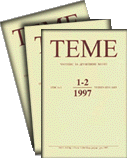Vulnerability of Roma Children in the Municipality of Shuto Orizari
Vulnerability of Roma Children in the Municipality of Shuto Orizari
Author(s): Divna Lakinska-PopovskaSubject(s): Social Sciences
Published by: Универзитет у Нишу
Keywords: Romani family; Romani mother; Romani children; vulnerability;
Summary/Abstract: The study is mainly directed towards analysis of the vulnerability of Roma children in the municipality of Shuto Orizari (Skopje), where 6.936 Roma children live or 49,64% of the total Roma population. Majority of children is in school age 54,42% (3.775) of whom 37,95% (2.632) is primary school pupils. According to the statistical information in 1996 Roma job seekers participated with 4,7% in the total number of job seekers in the Republic of Macedonia. The majority of the population in Shuto Orizari lives with the social benefits in cash or permanent financial assistance in cash granted by the state and they are not yet engaged in any voluntary working activities by which they could contribute to the betterment of the living or ecological and communal conditions in the municipality. In the search for financial means some parents engage their children (2,44% or 62 children) in different forms of low paid jobs (trade on the black market, work abuse). Considering the fact that this data were obtained by the statements of the parents, and although the surveyors were all well familiarised with the situation in field, we still believe that the number of these children is much bigger than presented. About 2,47% (77) children are forced to beg. The number of abused and neglected Roma children is a warning sign that efforts must be made by the state or non-governmental organisations for opening day-care centres as well as other forms directed towards stamping out of this negative tendency. The Centres could also offer its services to the drug or alcohol-addicted children or delinquents living on the territory of the municipality. About 1,77% (123 children) are placed under some forms of child protection - guardianship. We find foster family care the most appropriate form for children without parents and parental care and therefore recommend that strong support should be given to its further development. For those grandparents who look after their grandchildren alone, organised advisory services and assistance should be at hand. Taking into account that there are 86 children with mental disabilities in the municipality and that only 3% of them attend special school, all existing factors should be engaged in overcoming this problem. It would be very important to organise multidimensional institutions for Roma children (such as Day Centres, Advisory Services, Sport Clubs and so on) where their free time will be organised, they will be assisted in learning and provided services in relation to the needs not only of the children but also of their families.
Journal: Teme - Časopis za Društvene Nauke
- Issue Year: 2002
- Issue No: 01
- Page Range: 143-167
- Page Count: 25
- Language: English

